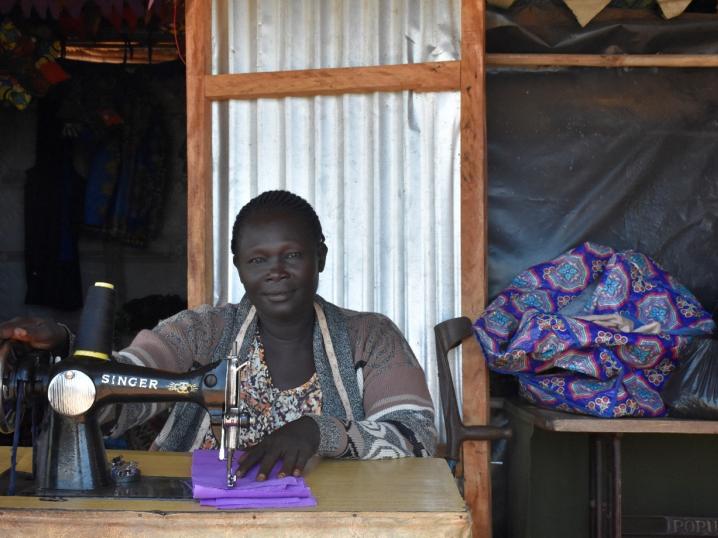Tailor-made hopes and dreams

For the many that escaped South Sudan and embarked on the uncertain passage to Uganda, the challenges are numerous. For Annette (44), who has a disability which makes it difficult for her to walk, the journey was twice as hard.
In Kajokeji, South Sudan, Annette worked as a tailor. She was a widow with five children to provide for. When the war broke out and everyone around her started to leave their homes, she was unable to walk the two-day journey to Uganda as many others did. Instead, she used her savings to pay 100,000 SSP (USD $770) for a lorry to transport her family a part of the way. She recalls making the journey in January 2017: making sure her five children and mother were not separated, and having to sleep in the bush. She remembers people fighting for water.
“We spent a year in the camp (in Uganda),” she says. “Because of my leg, I could not build a house myself as many others did, but a church pastor and World Vision helped me.” Like other families living in their settlement, Annette received maize, cooking oil and soap through aid organisations’ distributions. Most would sell portions of these rations to be able to purchase other things that they needed. “But I can’t do this,” says Annette. “I need it for the children.”
The family had not been able to bring much, but Annette had managed to bring her sewing machine. She started making baby clothes, building herself a small make-do shop space. She now sews uniforms for children in the settlement and dresses from the bright cloth that she purchases from town.
She was part of a savings group in the settlement, where the group members pool their savings and makes small loans within the group to ensure each member is provided for. The savings group obtained a loan itself from VisionFund in an exciting new pilot project, to enhance the pool of funds and further enhance the borrowing capacity of refugee and host families in Uganda. This allowed Annette to take a larger loan than what the group usually offered, and she used this loan to purchase cloth for her business and pay for transport to town.
Annette wants to buy a new sewing machine as she says that hers is old; she wants a new one to be able to do embroidery work and also an overlock machine. Her plan is to have small sewing school, and teach others to make clothes.
Her eldest daughter (18) is just finishing school and wants to be a nurse. Annette hopes to be able to support all her children to finish school.
“What is good here is that there is peace. There is no war. But if we stay here in Uganda and do not go back, we will have to buy land and make plans to fully settle down,” she says.
For many others like Annette, who have left their homeland and are now faced with building their lives anew and considering options for their children’s future, microfinance provides a helping hand to pave the way for financial stability.
Story by: Megali Nanayakkara, VisionFund International